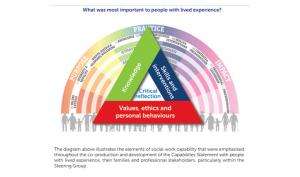Induction tool
Using the capabilities statement to build and sustain positive relationships with adults with a learning disability
Social work with adults with a learning disability is about building and maintaining relationships, supporting people to deal with a range of issues that may be impacting upon their life: “the small and the big stuff” - recognising the impact of discrimination and the importance of social and rights-based approaches.
This tool can be used by social workers at the start of their career or by more experienced social workers who may be new to working with people with learning disabilities.
The tool supports a rights and relationship based approach to working with adults with a learning disability and should be viewed alongside the short video featuring Jill, Jackie and Brendan from Synergy.
The capabilities that people with lived experience said were the most important to them were:
- Knowledge
- Skills and interventions
- Values, ethics and personal behaviours.
The graphic below provides an illustration of where these capabilities sit within the over-arching Professional Capabilities framework:

This tool has been developed by people with lived experience, social workers, and advocacy organisations, to support social workers to develop and demonstrate the capabilities that are most important to people with learning disabilities. This includes building and sustaining positive working relationships with people and their families.
The tool should be read and used in conjunction with the practice elements of the Capabilities Statement, to plan and prepare for home visits to an adult with a learning disability and to reflect on practice, to aid learning and development.
Before you visit/meet the person you should consider the following:
Knowledge
- How can you use the capabilities statements to help you plan your interaction/visit to the person/family? (also see Top Tips information sheet)
- How will you ensure that the visit is accessible for the person in terms of the way they communicate?
- The environment where you will meet the person – including any access considerations of sensory needs e.g. lighting, impact of noise (air conditioner) etc
- What information do you need to take with you to the visit that you can give to the person?
- Who else do you need to speak to about the visit?
- What information and joint decisions you need to talk to the person about
- Have you got a way of contacting the person that they are comfortable with if you are going to be late?
Skills and Interventions
- How will you make contact and arrange the visit?
- How are you going to actively engage with and involve the person with a learning disability?
- What accessible information can you send out in advance of the visit? (Hint- consider the role of the social worker tool)
- Are there any communication aids that the person uses that you need to familiarise yourself with?
- Have you planned how you will get there to ensure you are on time?
Values, ethics and personal behaviours
- Have you offered the person the opportunity to have someone else they trust present at the visit?
- Have you helped them choose an accessible environment to meet that they are comfortable with?
- How will you find out and record the person’s wishes and feelings with their involvement as much as possible?
- How you feel about visiting this person, have you explored this with colleagues and/or your manager?
During the visit to the person- consider the following:
Knowledge
- Have you explained your role and the reason for the visit?
- What barriers have you identified to the person having control of their life?
- Have you clarified what will be discussed and what will happen next?
Skills and Interventions
- How do you demonstrate that you are listening to the person?
- What do you do to help the person feel comfortable?
- How do you provide information to the person?
- What do you do to check their understanding during the meeting and in summarising at the end?
- How do you explore the person’s right to make their own decisions and any support they may need to assist them with this?
Values, ethics and personal behaviours
- Are you aware of how you are feeling and behaving towards the person?
- Consider your values and ethics throughout the meeting and the impact that may have on how you engage with the person.
- Have you identified what the person likes to do and what they feel they are good at?
- Have you identified what is important to the person?
- How are you capturing their wishes and feelings with their involvement?
After the visit to the person and/or family- Use the following questions to critically reflect upon the capabilities drawn upon in this situation:
Knowledge
- Think of an example during the visit when the Capabilities Statement informed your approach/your response/your behaviour
Values, ethics and personal behaviours
- How did the visit go? The positives and strengths of the meeting and anything you could do to improve future contact
- Reflect on your experience of using the Capabilities Statement- was it positive/negative?
- What feelings did you experience during and after the visit?
- Explore the impact of your feelings on your behaviour and decision making
- Consider your own values and the impact on the situation
Skills and Interventions
- What went well/not so well AND how do you know? (think about using the feedback tool to provide evidence here)
- What would you do differently next time?
Engaging in the above will provide evidence in relation to Standard 4.6, 4.7, 4.8 Maintaining my Continuous Professional Development of the regulatory Professional standards for social workers set by Social Work England.
